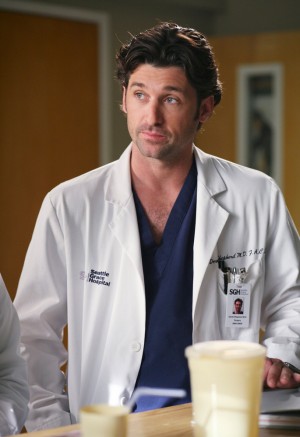Profile
‘Grey’s Anatomy’ gets some red and green flair
When Dr. Shepherd (Patrick Dempsey) from “Grey’s Anatomy” needed medical treatment, writers came to Dr. MacKinnon for advice.
A few months ago, writers from the show contacted MacKinnon, chief of the Division of Plastic and Reconstructive Surgery at the Wash. U. School of Medicine, concerning the recent nerve injury sustained by the show’s lead surgeon, Dr. Shepherd.
“My secretary told me, ‘Someone who is working with ‘Grey’s Anatomy’ wants to talk to you,’” MacKinnon, known for her expertise in nerve injury, recalled. “And I said, ‘Yes! That would be fun and different.’”
From what MacKinnon understands about the procedure, “Grey’s has a company that looks for medical experts. The writers would say, ‘We have a plot line on nerves,’ and then their company would gather information on nerves and work from there.”
As a doctor often faced with strict procedures in which there is little to no wiggle room, MacKinnon stated, “I enjoyed the fact that [the characters] can do whatever they want.”
MacKinnon communicated with the show’s writers via video tutorials, explaining specific surgeries necessary for nerve repair, work she has been compiling along with her partner, Ida Fox, for the last four to five years. At one point during these sessions the writers told MacKinnon, “We’d love to use a synopsis of the surgeries, but we don’t want to do the exact operation that you suggested.”
The label “medical drama” associated with shows like “Grey’s Anatomy” is usually taken with a grain of salt. The drive to keep viewers watching typically outweighs the necessity for medical accuracy.
As sophomore Tenaya Drapkin put it, “They make it very sexy and fun in order to keep interest in their profession.”
MacKinnon admitted that the writers of “Grey’s Anatomy” “do make up their own parts so it’s not completely, 100 percent accurate…but I’m impressed that they are doing the research necessary to be as accurate as the plot, the drama and the interest of the show would allow. I think that is one of the reasons this show is so successful—because it is real.”
Or, at least, real enough. For many, even Wash. U. students already on their way to becoming doctors, television shows like “Grey’s Anatomy” inspire career paths and offer perspective into the medical field, whether it is an accurate reflection or not.
“It’s great that people take inspiration from these shows, but a lot of the allure has to do with the drama and personal relationships, and less of the doctors in the show,” sophomore Natalie Chaney said. “I think it’s great to take inspiration, but being a doctor is extremely different from that and not as glamorous a field as it is shown.”
Although senior Melissa Turkel also recognized the show’s partial representation of hospital life, she still found it a valuable resource for younger adults. “People start watching these shows really young and you don’t start learning about the medical field until you are much older, so it’s not surprising if [‘Grey’s Anatomy’ is] the thing that gets you into the excitement of medicine.”
Admittedly not a viewer of the show before being contacted, MacKinnon refers to herself now as an “avid fan.” She said in regards to her abstinence from medical dramas, “it’s not surprising. I get enough medicine in my life…The reason I didn’t watch it is because I live it, I don’t need to watch it too.”
Dr. MacKinnon, who never owned a TV in her life until her oldest child turned seven years old, has mixed feelings about prospective doctors looking to “Grey’s Anatomy” now that she has become involved in the show. On one hand, she stated, “If they are going to watch TV for an hour—it’s a fun thing to do. If they’ve got an hour to watch TV, it should be ‘Grey’s Anatomy.’” I think anyone that is watching is going to know you are not surrounded by fabulous, gorgeous, romantic relationships all the time.”
On the other hand, she said, “It’s not that our lives are so dramatic, but [those of] the people we look after. We are seeing them at one of the one times their life is in crisis. It’s a hugely intense time in their lives, and that becomes part of our lives too. If people were to watch ‘Grey’s Anatomy’ and think, ‘I don’t want that tension, pressure, responsibility for other people,’ then great, don’t go into medicine. If it had been around when I was making a decision, I would have enjoyed being able to see it.”

